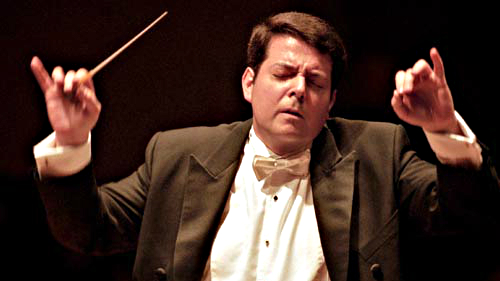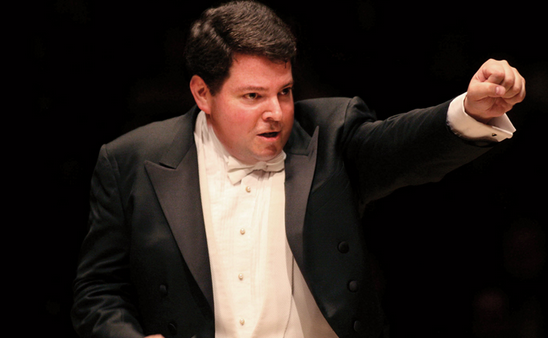

World-renowned conductor Andrew Litton, who’s already a very busy man, has sealed a couple of deals that promise more challenges in the near future.
Litton has agreed to continue his tenure as music director with the Colorado Symphony through the 2017/18 season. He will also become the New York City Ballet’s (NYCB) next music director.
Litton said Wednesday that while the future of the Colorado Symphony is bright, it also holds uncertainties. That includes financial stability and how the future Denver Performing Arts Complex redevelopment will impact the organization.
“I’m committed to continually pushing us forward," he said. "With so much going on, it’s silly to contemplate leaving. We are creating our MO every day, and that’s both thrilling and scary."
Litton was the Colorado Symphony’s artistic adviser from 2012-2013 before being named music director. Under his guidance, the symphony has sought more recordings and partnerships with labels like Sweden's BIS Records.
“Andrew is the Peyton Manning of the orchestra world, and Denver is fortunate to have a conductor of his caliber on the podium and behind the scenes,” said Jerry Kern, the Colorado Symphony’s CEO and board co-chair. "We presume we’ll become even better under his leadership moving forward."
Litton also serves as music director for the Bergen Philharmonic Orchestra in Norway, a term that will conclude in October after 12 years.
"Frankly the wear and tear on me is going to be much less," Litton said. "I think it’s actually going to enhance the time I can spend in Denver, and the Colorado Symphony may end up actually seeing more of me."
Litton said he will spend substantially less time traveling between jobs after the New York City Ballet also announced this week his appointment as its next music director. The hire marks the end of a two-year search for the institution, which considered more than 20 conductors for the role.
Litton's short history with NYCB dates back to earlier this year when he served as guest conductor during several performances of George Balanchine and Alexandra Danilova’s “Coppélia,” with music by Léo Delibes.
"He was clearly a person who was on a slightly different level," ballet master in chief Peter Martins said. "Everybody fell in love with him, the staff, the ballet masters, and more importantly the orchestra."
Litton will conduct his first performance in September 2015. The four-year contract has Litton working with NYCB for 13 weeks next year and 16 in each of the following seasons.
While it's unusual for a symphony conductor like Litton to take on this type of role, he said the NYCB's diverse repertoire demonstrates a unique commitment to orchestral music.
"To go into this position with a company that’s eager for the music to have a position of prominence is very exciting," Litton said.
Plus, the conductor said he couldn't pass up an opportunity to work in his hometown. Litton grew up on the Upper West Side of Manhattan -- near the Lincoln Center, where NYCB performs -- and now lives in New York with his family.
But he estimates only spending about eight weeks a year at home in recent years.
"It's been very challenging," Litton said.
The NYCB orchestra currently consists of 62 players, while the Colorado Symphony's standard ensemble totals 80.
Major symphony music directors commonly hold appointments with multiple orchestras. That includes Yannick Nézet-Séguin -- who serves as music director of the Philadelphia Orchestra and the Rotterdam Philharmonic Orchestra in the Netherlands -- and Marin Alsop, music director of the Baltimore Symphony and São Paulo Symphony orchestras.
That's often on top of guest conducting duties that span the globe, and Litton will continue to pursue guest conducting opportunities in cities like Bergen, London, Tokyo and Melbourne.
Neither Litton or CEO Jerry Kern expect the music director's new gig to detract from his commitment to the Colorado Symphony. Litton will still spend at least eight weeks in Denver each season.
"I think having him closer is going to be a very positive thing in terms of the development of the orchestra and his ability to get to Denver more frequently and get more integrated into the community," Kern said.








